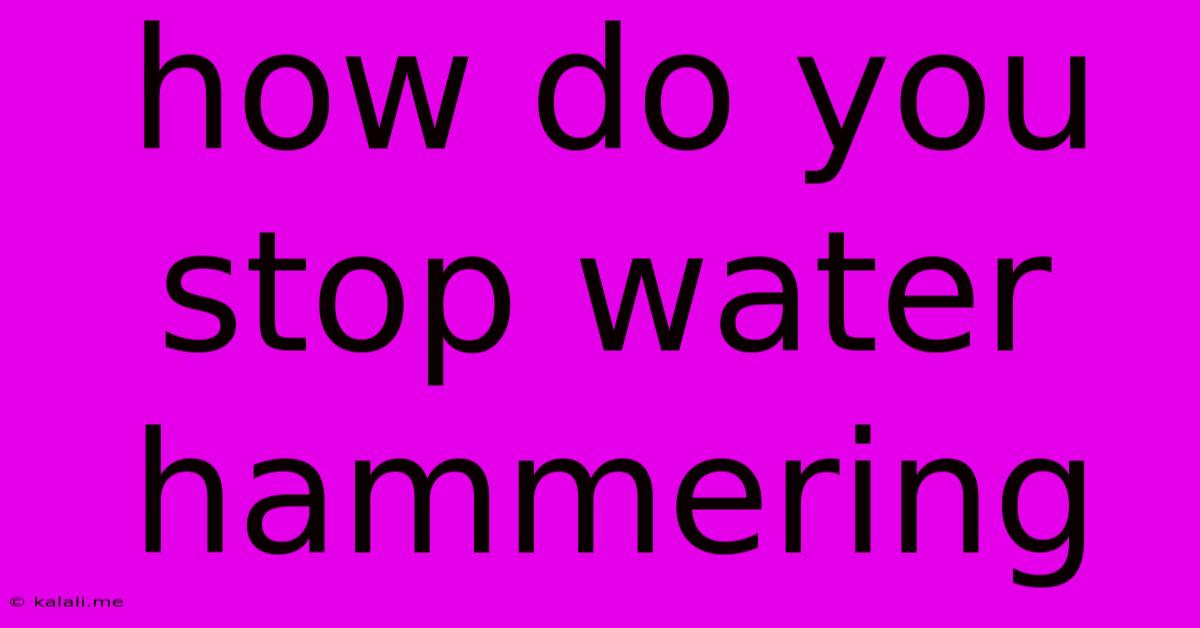How Do You Stop Water Hammering
Kalali
May 21, 2025 · 3 min read

Table of Contents
How to Stop Water Hammer: A Comprehensive Guide
Water hammer, that unsettling banging sound in your pipes, is more than just annoying – it can be a sign of potential plumbing problems. This comprehensive guide will explore the causes of water hammer, and most importantly, provide effective solutions to silence those disruptive noises and protect your plumbing system. This article will cover everything from identifying the source to implementing DIY fixes and when to call a professional plumber.
What is Water Hammer?
Water hammer occurs when the flow of water in your pipes suddenly stops. This abrupt halt causes a surge of pressure, creating a hammering or banging sound. Common culprits include quickly closing faucets, operating appliances like washing machines or dishwashers, and even the automatic shutoff valves in your toilet. This pressure surge can damage pipes over time, leading to leaks and costly repairs. Understanding the cause is the first step in effectively stopping water hammer.
Identifying the Source of the Water Hammer:
Before tackling the problem, pinpoint the location of the noise. Listen carefully to determine which pipes are making the most noise. This will help you focus your efforts on the affected areas. Consider the timing of the noise; does it coincide with using specific faucets, appliances, or toilets? This observation can significantly narrow down the potential causes.
Effective Solutions to Stop Water Hammer:
Several methods can effectively mitigate or eliminate water hammer. Here are some of the most common and effective approaches:
1. Install Water Hammer Arrestors:
This is often the most effective and straightforward solution. Water hammer arrestors are small, inexpensive devices that are installed directly onto the pipes. They act as shock absorbers, absorbing the pressure surge and preventing the banging sound. These devices are readily available at most hardware stores and are relatively easy to install, though some plumbing experience is helpful.
2. Air Chambers:
Many older plumbing systems incorporate air chambers, small vertical pipes attached to the main water lines. These chambers trap air, which compresses to absorb the pressure surge. If your system has air chambers, ensure they are not clogged with water or debris. This might involve carefully draining and refilling the pipes. However, if your system lacks air chambers, adding them is a more involved plumbing project that requires professional expertise.
3. Check and Repair Leaky Faucets:
Leaking faucets can contribute to water hammer, as the constant dripping can cause pressure fluctuations. Addressing these leaks promptly can minimize the occurrence of water hammer, improving your plumbing efficiency.
4. Slow-Closing Faucets:
Consider replacing your existing faucets with slow-closing models. This allows the water to stop gradually, reducing the impact of the pressure surge and lessening the likelihood of water hammer. This is a relatively inexpensive and simple upgrade that can make a noticeable difference.
5. Insulate Pipes:
While not directly addressing the pressure surge, insulating pipes can muffle the sound of water hammer. This is a helpful secondary measure to reduce the noise level, even if the banging itself isn't entirely eliminated.
When to Call a Plumber:
While many water hammer solutions are DIY-friendly, some situations require professional help:
- Severe Water Hammer: If the banging is exceptionally loud or persistent, it's best to consult a plumber. Severe water hammer could indicate a more significant plumbing problem.
- Extensive Plumbing Work: Installing air chambers or making other major adjustments to your plumbing system is best left to licensed plumbers.
- Uncertain of the Cause: If you're unable to identify the source of the water hammer, a plumber can diagnose the issue and recommend the most suitable solution.
By understanding the causes of water hammer and implementing these solutions, you can effectively silence those disruptive bangs and protect your plumbing system from potential damage. Remember, preventative maintenance is key to a smoothly running plumbing system. Regularly checking your faucets and pipes for leaks and ensuring proper water pressure can go a long way in avoiding future water hammer issues.
Latest Posts
Latest Posts
-
How Rare Can You Eat A Steak
May 21, 2025
-
Clash Of The Titans Type Movies
May 21, 2025
-
How Does Gibbs Get The Boat Out Of The Basement
May 21, 2025
-
What Is The Plural Of Business
May 21, 2025
-
What Is The Difference Between Pasta And Noodles
May 21, 2025
Related Post
Thank you for visiting our website which covers about How Do You Stop Water Hammering . We hope the information provided has been useful to you. Feel free to contact us if you have any questions or need further assistance. See you next time and don't miss to bookmark.